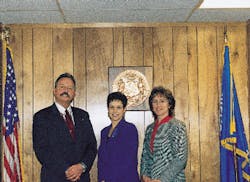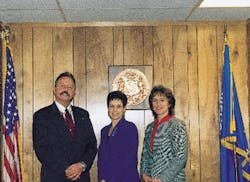Three on the board
By serving on the Wisconsin Dental Examiners Board, three hygienists help shape the profession`s future.
Cathy Seckman, RDH
As we approach the millennium at breakneck speed along with everyone else, hygienists pretty much agree that our profession has vast potential for change. Which direction the change should take, though, is still in question.
Some of us look toward a future that includes that magic word - autonomy. But as much as we might dream and hope and plan and expect, the reality is that very few hygienists are autonomous. We exist at the discretion of dentists. Our schooling, our licensing, and our working lives are controlled by dentists. Some hygienists believe that`s not such a bad thing. Rather than fighting the system, they believe in becoming a part of it - using it to improve the future of dental hygiene.
Beth Jacko-Clemence of Hales Corners, Wisc., is one of those hygienists. "It is important to work within the system," she emphasizes. "The hygienists (in Wisconsin) accomplished much more when they switched directions from fighting for a separate examining board to working with the dental association to expand our representation on the existing board and to expand our scope of practice. I think we work best when we work together as a team. Since we`re all involved in this together, it`s important for all of us to have input."
That said, Jacko-Clemence does not consider herself a traditionalist. "I do not want to just stick to the status quo. I want to advance the profession by working within the system to bring about changes that would benefit dentistry, dental hygiene, and, most of all, the public we serve." She believes patients benefit the most from the services of the dentist and hygienist when the two work together.
"I do not believe we should have separate boards. I feel that the dentists benefit from the perspective and advice of a dental hygienist, and vice versa. Since we both perform the same services, two sets of rules and standards could result in conflicts and confusion. The public needs the same degree of quality and protection whether the work is performed by a dentist or hygienist."
For the past seven years, Jacko-Clemence has served on the Wisconsin Dental Examining Board, one of three hygienists who, with six dentists and two members of the public, make up the state`s dental-regulatory team. The other hygienists are Nanette Kosydar Dreves of LaCrosse, Wisc., and David Carroll of Schofield, Wisc.
The three are committed to the reality of dental hygiene as it exists today. Carroll has a vision for the future of hygiene that falls right in line with that reality: "I`m trying to unite hygienists and dentists and focus us as a team, not as separate entities. We need to be more of a team to deliver the best possible care."
Dreves compares our profession to that of physician`s assistants or nurse practitioners. Like them, she says, "We need to continue expanding our capabilities to allow for growth amongst a diverse group of capable, educated individuals." She sees part of her board duties as trying to eliminate some of the adversity between hygienists and dentists. "I am assertive about expressing my opinion and perspective, but I will listen to all views and respond with professionalism. It`s important for me to remember that I represent more than just Nan Kosydar Dreves, individual. As a dental hygiene professional, I have to be able to view issues in the context of the dental consumer and the entire dental team, not (just my own) turf."
While other hygienists might chafe under the restrictions of the profession, these three have embraced the restrictions and are working to define and expand them from within. Hygienists in Wisconsin soon will be able to administer local anesthesia dispense oral premedications, and place local chemotherapeutic agents. Jacko-Clemence, Carroll, and Dreves are on the team writing language for new laws to regulate that.
It`s interesting to look over the shoulders of these three, to see how they got to the inside track, and how they work there to extend the horizons of their profession.
Each hygienist came to the DentistalExamining Board of Wisconsin, or DEB, by a different route. Jacko-Clemence earned a bachelor`s degree in dental hygiene from Marquette University in 1979. She chose hygiene because it gave her an opportunity to interact with and help people. "It`s an ideal profession," she says, "both challenging and rewarding. I plan on staying with it for life."
She and her husband, Keith, a dentist, have three children who might have inspired her secret life as the Tooth Fairy. She visits schools and events for children through the year dressed as a glittering Tooth Fairy complete with wings, tiara, and dental health tips. As a member and past president of both the Milwaukee Regional Dental Hygiene Association and the Alliance of the Great Milwaukee Dental Association, she has a long record of community service. She has served on the accreditation team for a local dental hygiene school. She also works part-time in several offices, including her husband`s. She believes her gubernatorial appointment to the DEB in 1992 came about because of her professional associations and community health work.
Carroll was recommended for the DEB by the president of the state dental hygiene association. He works as a hygienist several days a month, and owns a company that produces specialty dental health products, including safety toothbrushes for children.
Dreves was nominated for her appointment by her professional association, and through references from political associates. She believes she was chosen partly for her knowledge of dentistry as a business entity and her background in dental occupational-safety education. Dreves started out with an associate`s degree in dental hygiene from Ferris State University in 1977, and recently earned a bachelor`s degree in business administration from Cardinal Stitch University. She and her husband, Chris, have a blended family of three children.
Dreves became a hygienist because it appealed to her interest to provide health care in a preventive light. "Working with people to improve themselves by offering skill, knowledge, and education was my goal. The job market, caretaking skills, the salary, the work environment, all appealed to me. It fit my personality."
She worked as a hygienist in a variety of practices in Michigan and Wisconsin, and maintains licenses for those states, plus California, Illinois, and Washington. She`s a dry-fingered hygienist now, working full-time as supervisor/manager of the dental support team at Gundersen Lutheran Medical Center in LaCrosse.
Twelve dental specialists are in the facility. Her team includes more than 40 dental assistants, nine hygienists, and four lab technicians, plus financial representatives, receptionists, a secretary, and treatment coordinators. Dreves also is a public speaker on such topics as OSHA, CPR, team-building, conflict resolution, and humor in the workplace.
The work the three hygienists do for the DEB is as diverse as their backgrounds. Each has assigned duties, working separately and independently. The board meets in the state capital, Madison, every other month, and arranges a conference phone call in alternate months. Members are paid per diem, plus meals and mileage.
Jacko-Clemence is the board`s secretary. As such, her signature appears on all new dental and dental hygiene licenses. She reviews all hygiene-license applications, except those from students; screens disciplinary cases; and reviews and writes questions for the state`s jurisprudence exam.
Carroll conducts examinations for a regional testing service, and helped write the exam itself. He also is part of an accreditation team for dental hygiene schools.
Dreves, as a new member of the board, has been researching continuing education. She plans to be a proponent of expanded duties, along with standardized educational requirements for both hygienists and assistants. Neither currently has a CE obligation in Wisconsin. She also is interested in developing laws to protect the safety of the dental consumer.
During their tenure on the DEB, each hygienist not only serves the dental profession, but the dental consumer as well. Jacko-Clemence feels strongly that the board?s primary purpose is to protect and serve the public. Board members do that by applying the rules fairly and justly.
OAs new rules are needed and written to bring the practice of dentistry and dental hygiene into the next millennium, I want to be sure that adequate standards are set to protect the public,O she says.
Carroll agrees. OMy goal is to see to it that individuals in the state are exposed to the best, possible dental care. That?s what we do on the board. We are consumer protectors.O
All the board members review consumer concerns. During her tenure, Jacko-Clemence has served as a board screener to review all incoming complaints. She then decided if the case met the criteria needed to open it for formal investigation.
Carroll says, OSince I?ve been on the board, I?ve been quite impressed with how focused it is on protecting consumers. Sometimes people have a complaint about a dentist. The state will give the case to us, and when we get it, we become the prosecutors. Should we reprimand the person, take a license away, what? The disciplinary stuff is the bad part. Most of the board?s work is good, but the bad part is that (dental professionals) can make bad decisions.O
All three have been impressed with the compatibility of board members. OThe DEB works well as a team,O says Dreves. OWe listen to each others? views with interest and respect. This may not be true for all dental offices, but it certainly is within our licensing board.O
Jacko-Clemence, serving her second four-year term, is honored to be a member of the board. OI think we are all respected as individuals and not as dentists or hygienists. As a hygiene member, I?m not treated any differently, I?m just one of the group. We?ve been very close, even friends. When they came to me, I thought it would be a wonderful learning experience, and it has turned out to be just that. It?s a chance for me to give something back to dentistry.O
Making a difference is the key for these three hygienists. All are working not just for themselves and their patients, but for dentistry as a whole. They are helping to shape the future of dental hygiene by working from the inside out to effect positive change.
Left to right, hygienists David Carroll, Beth Jacko-Clemence, and Nan Koysdar Dreves serve on the Wisconsin Dental Examiners Board.
Beth Jacko-Clemence, alias the Tooth Fairy, poses with some children at one of the schools she visits throughout the year, providing tips about dental health.


